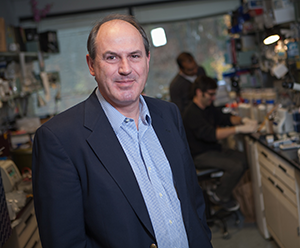Overview of the Program in Molecular Medicine

H. Arthur Smith Professor and Chair
The Program in Molecular Medicine was established in 1989 in the Two Biotech building located within the overall Medical School campus in the Massachusetts Biotechnology Research Park. The primary goal of the Program was to attract top academic scientists to meet the challenge of investigating exciting problems in biomedicine in the context of a collaborative culture. Michael Czech was appointed as the Founding Director. The Program was granted Department status in 2000.
The strategy for the scientific development of the Program was to assemble outstanding investigators with diverse, but overlapping scientific interests in order to probe molecular mechanisms that underlie physiological processes and the diseases associated with them. These laboratory groups brought a broad spectrum of expertise to the Program, including structural biology, advanced microscopy, molecular genetics, immunology, virology, and model organisms. The Program in Molecular Medicine initially included several laboratory groups already at the Medical School, and these founding faculty relocated to Two Biotech in 1989/1990. Over the next few years the Program recruited additional faculty affiliated with seven basic science and clinical departments. These included biochemistry and molecular biology, cell biology, medicine, molecular genetics and microbiology, pediatrics, pharmacology, and physiology.
Faculty recruitments and expansion of the UMass Chan Medical School campus with the building of the Lazare Research Building and the Sherman Center catalyzed the relocation of several Molecular Medicine laboratories, including Michael Green, Chair, Department of Molecular, Cell and Cancer Biology; Craig Mello, Co-Director, RNA Therapeutics Institute; Dale Greiner, Co-Director, Diabetes Center of Excellence; and Jason Kim, Director of the Mouse Metabolic Phenotyping Center. In addition to these laboratory groups, many other tenured and tenure track faculty in the Program in Systems Biology, Program in Bioinformatics and Integrative Biology, and the Diabetes Center of Excellence (that do not have departmental status) obtained primary faculty appointments in Molecular Medicine.
Craig Peterson was appointed as Vice Chair of Molecular Medicine in 2004 and continues to serve in this position.
Michael Czech stepped down from the leadership of the Program in Molecular Medicine after ~30 years of service in 2018. A national search for new leadership identified Roger Davis, one of the founding members of the Program, as the second Chair of the Program in Molecular Medicine in 2019.
Molecular Medicine now has 32 faculty with primary appointments and 20 faculty with secondary appointments who are active in faculty meetings, personnel action deliberations (including tenure decisions), retreats, seminars, journal clubs, faculty searches in the Program, and social functions. Molecular Medicine sponsors a monthly “in house” seminar program followed by faculty luncheon meetings and an outside speaker seminar program, graduate student and post-doctoral fellow research update meetings, graduate student and postdoctoral fellow-initiated outside speaker seminar programs, and monthly Chalk Talks for all Molecular Medicine faculty.
Molecular Medicine accomplishments in research have been recognized by the award of two Nobel Prizes in Physiology or Medicine awarded to Craig Mello (shared with Andrew Fire of Stanford University) in 2006, and Victor Ambros (shared with Gary Ruvkun of Harvard) in 2024. Additional accomplishments include the Lasker Basic Medical Research Award to Victor Ambros (shared with Gary Ruvkun of Harvard and David Baulcombe of Cambridge University), the Breakthrough Prize to Victor Ambros (shared with Gary Ruvkun of Harvard), the Medical Foundation Basic Science award to David Lambright, the Lillian Jean Kaplan Memorial award to Greg Pazour, the Steven C. Beering award to Roger Davis, the Banting award to Michael Czech, the Elizabeth Glaser Scientist award to Katherine Luzuriaga, a NIDA Avant Garde award to Jeremy Luban, NIH Director’s New innovator award to Paul Greer, Pew Scholar Awards to Tom Fazzio, Bert van den Berg and David Guertin, a Searle Scholar awards to Paul Greer and Jessica Spinelli, and Howard Hughes Medical Institute Investigator appointments to Roger Davis, Michael Green, and Craig Mello.
Molecular Medicine investigators have also been elected to the National Academy of Sciences (Ambros, Davis, Green & Mello), National Academy of Medicine (Davis), National Academy of Inventors (Davis & Mello), the Royal Society (Davis), American Academy of Arts & Sciences (Ambros, Davis, Green & Mello), American Association for the Advancement of Science (Davis & Peterson), American Academy of Microbiology (Davis, Luban, Luzuriaga & Sontheimer), American Society for Cell Biology (Pazour), and the European Molecular Biology Organization (Davis & Green).
The Program in Molecular Medicine offers a broad spectrum of state-of-the-art scientific approaches to biomedical research, including computational biology, structural biology (Cryo-EM & Xray), sequencing, advanced microscopy, metabolic phenotyping, CRISPR-based gene editing, RNAi-based gene silencing, and screening technology using genetic methods and small molecules. Medical School Core facilities also make available a large number of additional technologies available through a broad range of core facilities.
Faculty laboratory groups within the Program in Molecular Medicine are led by academic leaders in their respective fields of biology and medicine. The multidisciplinary nature of the Program has led to a significant number of collaborative publications by multiple laboratories. This is further enhanced by strong seminar and journal club activities as well as joint laboratory group meetings and consortium grants such as Keck and NIH-funded programs. Based on success in research and teaching, the Program attracts large numbers of graduate students, postdoctoral fellows, and visiting scientists who in turn greatly enrich its scientific environment.
